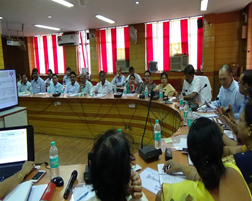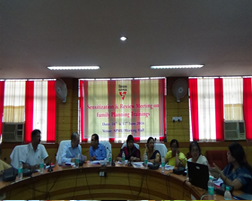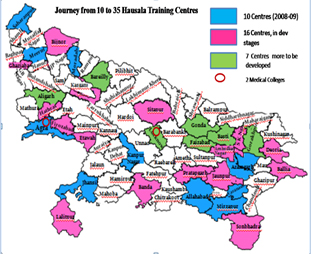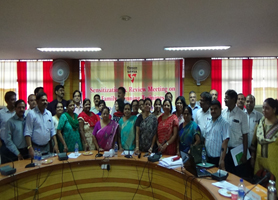Hausala Training Centres: Augmenting Skills, Assuring Quality
Commended for innovations in the field of family planning, SIFPSA has made yet another significant contribution by developing the district hospitals across the state as facility based clinical family planning training centres, recently rechristened 'Hausala Training Centres', strengthening the health infrastructure in Uttar Pradesh in a big way.
 SIFPSA has been in the forefront of bringing global best practices to clinical family planning services by way of establishing centres of excellence and decentralized training centres across the state. Clinical Family Planning activities are vastly supported by SIFPSA in Uttar Pradesh. Currently there are 10 facility based family planning training centres, spread across ten districts namely Agra, Allahabad, Azamgarh, Meerut, Moradabad, Mirzapur, Saharanpur, Kanpur Nagar, Jhansi & Varanasi, representing all four regions of the state.
SIFPSA has been in the forefront of bringing global best practices to clinical family planning services by way of establishing centres of excellence and decentralized training centres across the state. Clinical Family Planning activities are vastly supported by SIFPSA in Uttar Pradesh. Currently there are 10 facility based family planning training centres, spread across ten districts namely Agra, Allahabad, Azamgarh, Meerut, Moradabad, Mirzapur, Saharanpur, Kanpur Nagar, Jhansi & Varanasi, representing all four regions of the state.
These centres were established as Divisional Clinical Training Centres (DCTC), way back in 2008-09 by SIFPSA in District Women Hospitals, which led to a complete overhaul of the hospitals in terms of infrastructure, manpower, equipment, repair of operation theatres and establishment of training halls, in order to facilitate quality trainings. SIFPSA has also constantly been making concerted efforts to strengthen clinical skills of service providers posted in public health institutions ranging from district women hospitals to community health centres, primary health centres and subcentres for clinical FP services in the state.
The trainers for different family planning techniques were trained at Medical Colleges for passing on the high quality technical and clinical skills from the academic institutions to the divisional training centres. Specialized trainings were imparted to develop a pool of trainers at these DCTCs for Laparoscopic and Minilap sterilization techniques, no touch IUCD insertion technique and PPIUCD insertions. These 10 centres have been successfully delivering various trainings, to fulfill the mandate of one service provider in female sterilization at the block level and one IUCD provider up to the subcentre level. Series of induction trainings were provided to doctors and staff nurses in Minilap, Lapro, IUCD and PPIUCD techniques, which resulted in creating a large pool of service providers. Over 4000 doctors and paramedics have been trained in various family planning techniques since inception.
 SIFPSA played a definite role in quality assurance, ensuring that trainings were imparted as per set standards. In due course, National Health Mission, recognizing the potential, initiated the funding support of the 10 training centres to continue trainings planned under NHM. SIFPSA re-established its support to the already established ten centres in financial year 2015-16 in terms of manpower strengthening, program administration and other logistical support, facilitating various NHM funded clinical FP trainings. SIFPSA has also been facilitating training needs of the private sector providers supported by various development partners like PSI, MSI and HLFPPT in different techniques of Family Planning to encourage private sector contribution to FP2020 goals for the state.
SIFPSA played a definite role in quality assurance, ensuring that trainings were imparted as per set standards. In due course, National Health Mission, recognizing the potential, initiated the funding support of the 10 training centres to continue trainings planned under NHM. SIFPSA re-established its support to the already established ten centres in financial year 2015-16 in terms of manpower strengthening, program administration and other logistical support, facilitating various NHM funded clinical FP trainings. SIFPSA has also been facilitating training needs of the private sector providers supported by various development partners like PSI, MSI and HLFPPT in different techniques of Family Planning to encourage private sector contribution to FP2020 goals for the state.
Responding to the Government of India expectations of establishing one comprehensive training centre in each district, SIFPSA in 2016 has also initiated the strengthening of 16 additional district level hospitals that include district women hospitals and combined hospitals as facility based training centres for conducting various clinical family planning trainings. Considering the state requirement, first a preliminary assessment, including delivery load, FP performance for sterilization, available manpower, availability of trainer, space and willingness, was done by the divisional project managers of 18 divisions in consultation with concerned CMSs of district women/combined hospitals. The 16 districts are Firozabad, Pratapgarh, Ballia, Lalitpur, Etawah, Ghaziabad, Sonbhadra, Bijnor, jaunpur, Badaun, Sant Kabir Nagar, Banda, Ambedkar Nagar, Deoria, Hathras and Sitapur representing 16 divisions of the state.
 SIFPSA is committed to providing continued technical assistance in managing and strengthening family planning trainings in the state. In addition to the 10 already functional training centres and 16 new training centres, SIFPSA is now in the process of establishing seven more training centres at DWHs (Gonda, Bareilly, Basti, Gorakhpur, Lucknow, Aligarh and Faizabad) and also strengthening two medical colleges namely OBGY Department- KGMU, Lucknow and SN Medical College- Agra for technical support of these centres, thus covering all 18 divisions of Uttar Pradesh and making the training courses accessible to providers nearest to their place of posting.
SIFPSA is committed to providing continued technical assistance in managing and strengthening family planning trainings in the state. In addition to the 10 already functional training centres and 16 new training centres, SIFPSA is now in the process of establishing seven more training centres at DWHs (Gonda, Bareilly, Basti, Gorakhpur, Lucknow, Aligarh and Faizabad) and also strengthening two medical colleges namely OBGY Department- KGMU, Lucknow and SN Medical College- Agra for technical support of these centres, thus covering all 18 divisions of Uttar Pradesh and making the training courses accessible to providers nearest to their place of posting.
The sensitization and review meeting of the heads of the 35 training centres (10 old, 16 new and 9 upcoming) at SIFPSA on June 16 and 17, 2016 saw the rechristening of the facility based clinical training centres (FBCTCs) in the state as 'Hausala Training Centres' (HTCs), by the Executive Director SIFPSA. SIFPSA targets at fully established and operational 35 HTCs in FY 2016-17.
 SIFPSA does complete handholding of the clinical centres, following definite systems to foster the new centres through detailed orientations and trainings, providing standardized training material, formats and protocols and also carrying out regular monitoring. SIFPSA being the nodal agency for clinical family planning trainings, supports the state by sharing the database and reports of trainings conducted at the Hausala Training Centres with the Directorate of Family Welfare and NHM on regular basis. Post trainings, SIFPSA also supports the newly trained providers at their worksite, building conducive environment for site readiness for delivering quality services.
SIFPSA does complete handholding of the clinical centres, following definite systems to foster the new centres through detailed orientations and trainings, providing standardized training material, formats and protocols and also carrying out regular monitoring. SIFPSA being the nodal agency for clinical family planning trainings, supports the state by sharing the database and reports of trainings conducted at the Hausala Training Centres with the Directorate of Family Welfare and NHM on regular basis. Post trainings, SIFPSA also supports the newly trained providers at their worksite, building conducive environment for site readiness for delivering quality services.
Government of India has recently incorporated three new contraceptive methods i.e. Injectables, Progestron only pills & Centchroman, and free supply is expected in the year 2016-17. In addition to the other trainings, the HTCs will also focus on capacity building of service providers (Doctors, Staff Nurses & ANMs) for the new contraceptives methods and creating widespread information among various categories of service providers for increase in uptake of services and trainings of ANMs & SNs for service delivery.
SIFPSA also aims at strengthening the system of periodic reviews of family planning performance in the state.
SIFPSA stands committed to ensuring affordable quality family planning services to all individuals- as per their choice and within their reach. Capacity building in the form of technical support, clinical trainings and mentoring activities offered through HTCs will go a long way in realizing this commitment.
Best Practices / Ongoing Activities
- Health Partners' Forum - Fostering convergence, maximizing synergies
- Strengthening Implementation of RMNCH+A Health Strategies in UP
- Forging Partnerships for Augmenting Family Planning Performance in UP
- Garnering Support-Reinforcing Commitments: Working with the Village Health Sanitation and Nutrition Committee
- Moving towards excellence: Capacitating ASHA Sanginis for supportive supervision and performance improvement
- Folk Media - Health Messages through Edutainment"Chalo Gaon Ki Oar"
- Newsletter ASHAYEIN
- Lok Geeton Mei Beti English Hindi
- Chalo Gaon Ki Oar English Hindi
- HMIS & MCTS Training cum Review English Hindi
- Clinical Family Planning activities
- Hausala Sajheedari English Hindi
- mSehat English Hindi
- Sampoorna English Hindi
- Sehat Sandeshwahini English Hindi
- Sarthi Sandeshwahini English
- Sunehere Sapne Sanwarti Rahein
- Hausala Training Centres
- World Population Day English Hindi
- Barriers to Family Planning Use in Rural Uttar Pradesh English Hindi
- Out of Pocket Expenditure and Health Seeking Behaviour in Uttar Pradesh English Hindi
- Meri Sehat Mera Nirnay
Get in Touch with us
(Uttar Pradesh), INDIA
E-Mail : info@sifpsa.org
Phone :(91 - 0522) 2630902,997,741,896,899,894
Fax :
Site Manage by : MARG Software Solutions
2016 © SIFPSA All Rights Reserved
Number of Visitors

